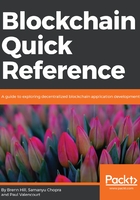
Censorship resistance
Decentralized systems tend to be much harder to censor because of a lack of a central authority to do the censoring. For free-speech and free-information purists, this is not seen as a downside in the slightest. However, some information (child pornography, hate speech, bomb-making instructions) is seen as dangerous or immoral for public dissemination and therefore should be censored. As a technology, anything actually written into the blockchain is immutable once the block holding that information is finished. For instance, Steemit is a blockchain-based social blogging platform where each post is saved to the chain. Once each block is finalized, the data cannot be removed. Clients of the system could choose not to show information, but the information would still be there for those who wanted to look.
The desire for censorship extends to self-censorship. Content written to the change is immutable—even for its author. For instance, financial transactions done via bitcoin can never be hidden from authorities. While bitcoin is anonymous, once a person is attached to a bitcoin wallet, it is possible to easily track every transaction ever done since the beginning of the blockchain.
Because of this, a blockchain-based national currency would allow perfect taxation—due to perfect financial surveillance of the chain. Censorship resistance is thus a double-edged sword.